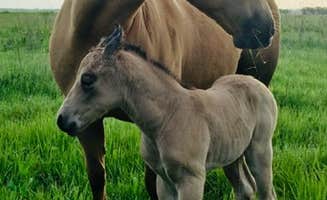Kanopolis State Park offers specialized equestrian camping 65 miles northwest of Great Bend, Kansas. Located in the Smoky Hills region at approximately 1,700 feet elevation, the park features distinctive limestone formations and sandstone bluffs characteristic of central Kansas. Horse camping sites are positioned on the northern side of Kanopolis Lake, where prairie meets woodland terrain.
What to do
Trail riding access: The Rockin' K Horse Campground provides direct access to designated equestrian trails through varied terrain. A camper noted, "There looked to be a trail for horse riding nearby," and the campground's layout accommodates riders with "numerous horse pens along with some dispersed camping area."
Swimming opportunities: When not riding, campers can cool off at nearby swimming areas. Mulberry Campground offers proximity to water recreation as one visitor mentioned: "Close to swimming beach, but bring your own water as there is no spigot nearby."
Rock exploration: The state park features unique geological formations for exploration. At Sandyshore Campground, one camper enjoyed "hiking through limestone. We found a couple caves and climbed some rock. Would be good for mntn biking."
What campers like
Clean facilities: The shower houses at the horse campground receive consistent praise. One visitor at Rockin' K Horse Campground stated the "shower house that we used was very clean and the water was actually hot! Very well maintained!"
Spacious campsites: Horse campers appreciate the thoughtful layout. As one Rockin' K guest observed, "Spots were well spaced and organized. Some had water/electric with others being just electric."
Lake views: The shoreline camping options provide scenic vantage points. A camper at Sandyshore Campground described it as a "Perfect mix of shade and shoreline. Beautiful views," highlighting the natural setting that complements equestrian activities.
What you should know
Reservation system: Rockin' K Horse Campground offers a practical check-in process for late arrivals. As one visitor noted, "Great system for checking in after hours without a reservation. Would stay again."
Seasonal considerations: Primitive campgrounds like Mulberry can offer solitude during peak holiday periods. One camper shared their July 4th experience: "Primitive campground is well maintained and largely unoccupied because of the lack of hookups for RVs... only one other family was in the entire campground."
Wildlife awareness: Ticks can be an issue in the warmer months. A visitor to Sandyshore cautioned, "bring tick spray can be brutal out there!" while another mentioned, "We ended up leaving because we found several tics and were worried about our dogs."
Tips for camping with families
Private options: For families seeking quiet equestrian camping alternatives near Great Bend, consider Hayland Farm's Horse Shoe Campground. A visitor described it as an "Excellent camp spot" with "quiet and beautiful" property and "warm and welcoming" hosts.
Beach activities: The sandy shoreline areas provide unexpected water recreation. A visitor to Sandyshore exclaimed, "The beach in KS?? We went for the weekend, mostly to do some hiking. Then realized we had found one of the best places in Kansas!"
Nature observation: Beyond horseback riding, the area offers wildlife viewing opportunities. At Mulberry Campground, one camper appreciated the "Great birds too!" along with the natural environment.
Tips from RVers
Hookup options: RV campers with horses have various utility connections available. At Sandyshore Campground, one visitor camping in site 093 found "All the facilities were very clean and the park was well maintained," making it suitable for "a weekend getaway or long fishing trip on the reservoir."
Site selection: Reserve spots early at popular campgrounds. A regular Sandyshore visitor advised, "wish they would make these spots reservable as they fill up very quick since they are first come first serve. Especially on weekends."
Campground occupancy: Off-peak seasons offer more solitude for equestrian camping. A visitor to Rockin' K in early October noted, "There was only one other camper at the campground when we went," indicating ideal timing for those seeking quieter horse camping experiences.


